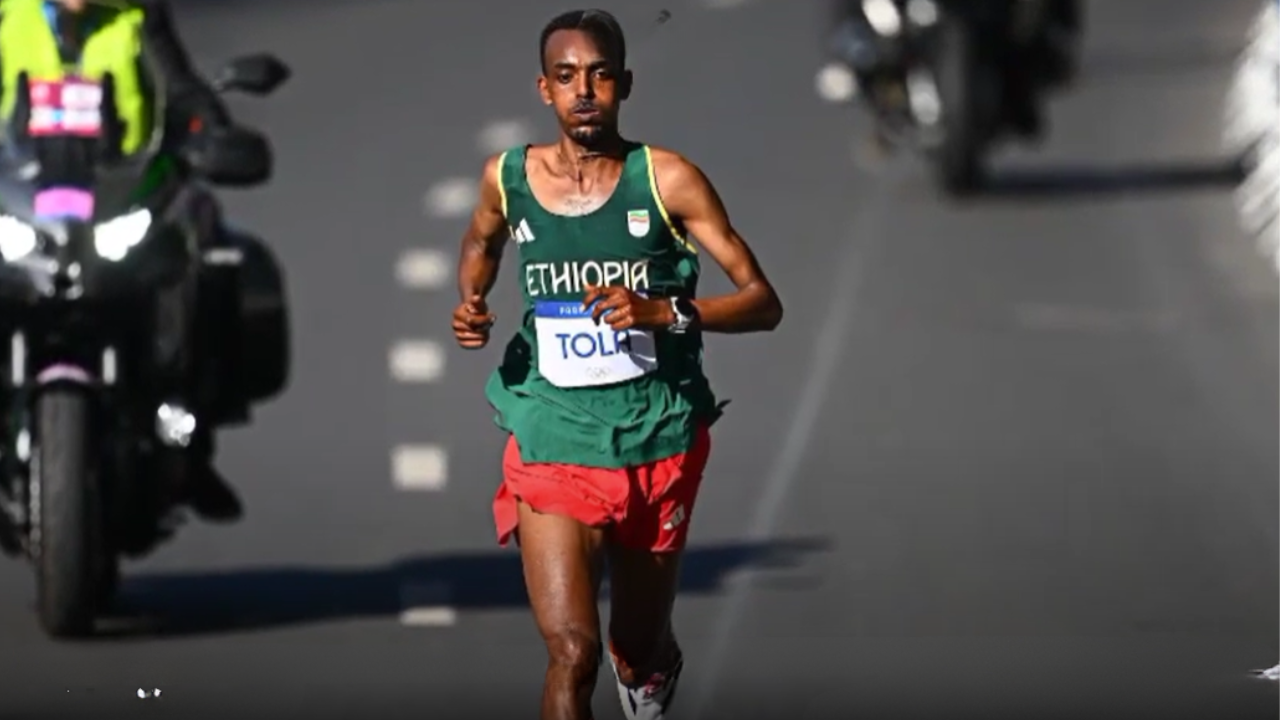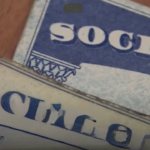Ethiopian runner Tamirat Tola ends Kenya’s supremacy in the men’s marathon at the Olympics in Paris.

Kenya’s hegemony in the men’s marathon was broken on Saturday when Ethiopian runner Tamirat Tola triumphed in the Paris Olympics.
With a time of 2 hours, 6 minutes, and 26 seconds, Tola set an Olympic record. Bashir Abdi of Belgium came in second, 21 seconds behind, and Benson Kipruto of Kenya took third place, 34 seconds behind.
As he approached the finish line, the 32-year-old Tola turned to face the crowd, but he was well away and had time to take in the cheers. It was his second Olympic medal, having won one in the Rio 2016 Games’ 10,000 meters.
The 35-year-old Abdi, who was born in Somalia, won his second Olympic medal as well, surpassing his bronze from the Tokyo Games three years prior.
At a significant race, Tola defeated Abdi in the marathon once more. In the 2022 world championships, when Abdi placed third, he defeated him.
After 42 kilometers (26 miles) in the sun, Emile Cairess of Britain finished fourth on Saturday and even had the stamina for a sprint finish.
Eliud Kipchoge, the two-time defending winner, had difficulty the entire way. At the 30-kilometer point, he was more than eight minutes behind Tola and did not finish.
Stephen Kiprotich of Uganda was the last non-Kenyan to win at the 2012 London Games.
Kipchoge, 39, was hoping to make history by winning the event three times, but he is only able to do so twice. Ethiopian Abebe Bikila won it twice in a row in 1960 and 1964, while Waldemar Cierpinski, who represented East Germany at the time, did the same in 1976 and 1980.
Contrary to custom, the women’s Olympic marathon will take place on Sunday rather than the men’s on the last day.
The course began at the Hôtel de Ville (City Hall), went through the parks and woodlands that were scattered along the way, and included one 436-meter rise and one slightly longer descent.
Running among iconic sites like the Louvre and Opéra Garnier, runners enjoyed the blue skies. They went by the Palace of Versailles, the former residence of French nobility, around midway through. Then, they made a U-turn and returned through the Meudon forest, passing the Eiffel Tower and approaching Paris.
With Italian Eyob Faniel leading and American Conner Mantz close behind, Tola was leading, but they were caught when a large group started to form again. At this point, Kipchoge was behind by more than a minute and retreated.
Subsequently, Tola gained momentum, and at 35 kilometers, he was 18 seconds ahead of fellow countrywoman Deresa Geleta, who came in sixth.
Two hours later, runners drew closer to the gold-domed Invalides monument, which houses the tomb of the French emperor Napoleon.
Hundreds of irate French farmers protested last year by driving up to the Invalides monument to demand permission to use pesticides that were outlawed for use on other crops, including sugar beets.
This time, there were no social tensions—instead, the audience cheered the backmarkers with hearty ovations and loving clapping as each runner crossed the finish line.
Gold is won by Tamirat Tola in the tough men’s marathon.
In a tough men’s marathon on Saturday, Ethiopia’s Tamirat Tola produced a tenacious performance to win gold in a time that set an Olympic record; two-time defending champion Eluid Kipchoge withdrew from the competition.
Kipchoge was expected to contend for the title in a field full of talented competitors. Legendary Ethiopian marathoner Haile Gebrselassie began the race, but instead of greeting Kipchoge at the finish line, he was there to celebrate fellow national Tola, whom he encouraged to start running when he was just 19 years old.
Tola, 32, broke the Beijing 2008 Olympic record by finishing the race in 2:06:26. This accomplishment is all the more amazing considering that he was a substitute for colleague Sisay Lemma, who was injured two weeks prior.
Kenya’s Benson Kipruto won bronze, and Belgium’s Bashir Abdi grabbed silver.
Starting from outside the Hotel de Ville, the starting point of the marathon route was the Palace of Versailles, the Trocadero, the Louvre museum, the Palais Garnier opera house, Place Vendome, and the Eiffel Tower. The narrative concluded with a picturesque residence directly beneath the 17th-century Esplanade des Invalides hospital.
With several steep hills scattered throughout a noticeably hilly course that was touted as one of the most grueling in Olympic history, the footrace at times had the feel of the Tour de France. At about 10 miles, there was the first ascent. The hill near the 18-mile mark proved to be the worst, with an incline of 13.5% at one point. Another hill a few miles later also had an effect.
Kipchoge was one of the well-known runners who had difficulties. Although he is among the greatest marathon runners of all time, he had an extremely difficult race; at one point, he was forced to walk up a hill at mile eighteen, nearly a full minute behind the leaders.
Not long after, he conceded the race.
It follows one of the hardest years of Kipchoge’s career, during which he endured severe internet harassment in the wake of his countryman Kelvin Kiptum’s passing. After having restless nights for a while, Kipchoge’s worst-ever professional performance came in March when he placed tenth at the Tokyo Marathon.
Tola was unfazed by the course, though. He put on a commanding performance that allowed him to lead before the midway point and never let up.
Tola’s lone prior Olympic medal came from Rio 2016, when he placed third in the men’s 10,000 meters. Having won the New York City marathon the previous year, it is also his second significant marathon triumph.









